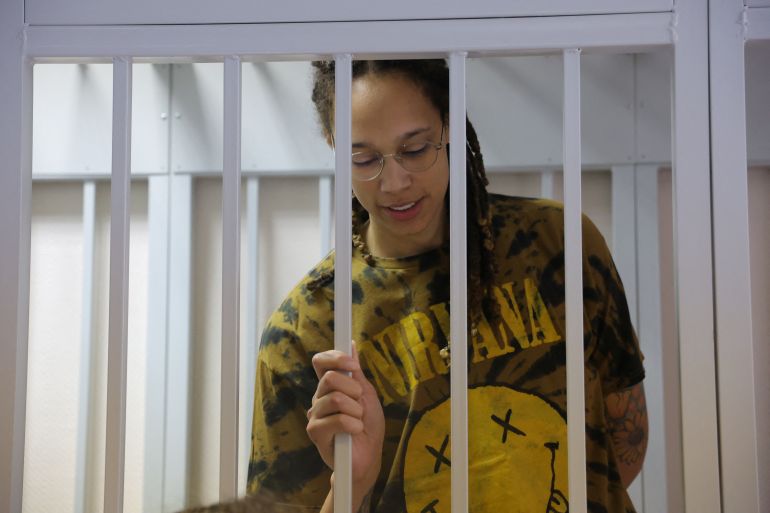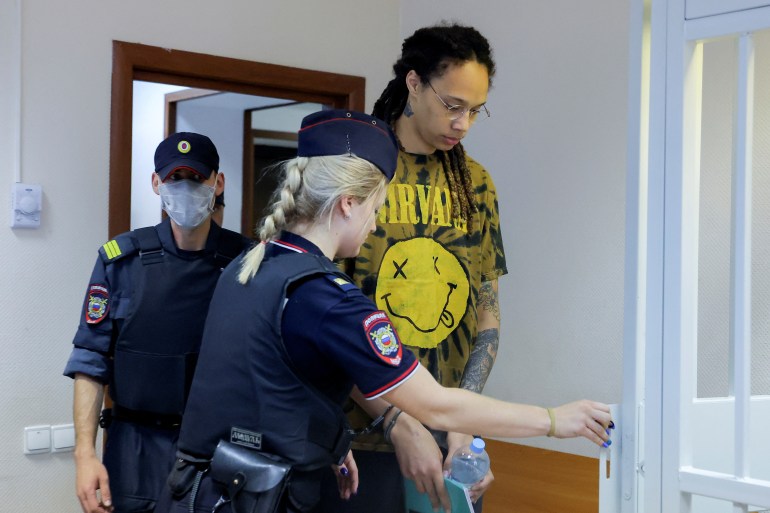Griner’s lawyers say WNBA star was prescribed medical cannabis
Brittney Griner had permission from US doctor to use cannabis for ‘chronic pains’, her defence team tells Russian court.

Lawyers defending US basketball player Brittney Griner, who is facing up to 10 years in prison on drug charges in Russia, have told a Russian court that Griner had permission from a doctor to use medical cannabis to treat an injury.
During the fourth hearing in Griner’s case on Friday, defence lawyer Maria Blagovolina said that a US “attending physician gave Brittney recommendations for the use of medical cannabis”.
Keep reading
list of 3 itemsUS basketball star Griner pleads guilty in Russian drug trial
Jailed WNBA star Griner appeals to Biden: ‘Get me home’
“The permission was issued on behalf of the Arizona Department of Health,” she told the courtroom just outside Moscow where the Women’s National Basketball Association (WNBA) All-Star’s trial is taking place.
Blagovolina also told the Reuters news agency that Griner’s defence team provided written evidence to the court on Friday, including “a doctor’s note for the substance that Brittney Griner inadvertently left among her belongings when crossing the border”.
Griner, a two-time Olympic gold medalist, was detained at the airport in the Russian capital in February after vape canisters with cannabis oil were discovered in her luggage. She pleaded guilty last week to drug possession and smuggling, but said she had no intention of committing a crime.
Her detention, which comes at a time of heightened tensions between the United States and Russia over the war in Ukraine, has prompted calls from Griner’s teammates and many others for US President Joe Biden to secure her immediate release.
The administration has said Griner is being “wrongfully detained” by the Russian authorities and that her case is a priority.
“I will emphasise again the commitment of the United States government at the very highest levels to bring home safely Brittney Griner and all US citizens wrongfully detained,” Elizabeth Rood, charge d’affaires at the US Embassy in Moscow, said following Friday’s hearing.
An admission of guilt does not automatically end a trial in Russia’s court system, and Griner has argued that she did not intend to break the law and had accidentally included the canisters in her luggage after packing quickly.
Griner, who plays for the Phoenix Mercury in the WNBA, was scheduled to play for Russian team UMMC Ekaterinburg in the US off-season – a common move for WNBA players who can make far more money playing abroad.
The WNBA star has received support from Russian sport figures such as UMMC Ekaterinburg club boss Maxim Ryabkov, who appeared at a hearing on Thursday to praise Griner’s good character. Ryabkov told the court that Griner demonstrated “outstanding abilities as a player and personal contribution to strengthening team spirit”.
“We very much miss her, her energy,” the captain of UMMC Ekaterinburg, Yevgenia Belyakova, also told reporters this week, adding that she wanted to “stand by [Griner] in these moments”.

In the US, teammates, loved ones and advocacy groups have called on the Biden administration to work for Griner’s release.
On July 4, American independence day, the union for WNBA players tweeted that it was “tough enjoying a day meant to celebrate independence when one of our own citizens, Brittney Griner, is STILL wrongfully detained in Russia”.
Biden spoke with Griner’s wife earlier this month and has said the US is pursuing “every avenue” to bring her home.
Meanwhile, Russian officials have downplayed suggestions that Griner could be freed in a prisoner exchange with the US.
Deputy Foreign Minister Sergei Ryabkov has noted that until her trial is finished “there are no formal or procedural reasons to talk about any further steps.”
Ryabkov also warned that descriptions of Griner as being “wrongfully detained”, a designation issued by the US Department of State, make it “difficult to engage in detailed discussion of any possible exchanges”.
Sitting in the defendant’s metal cage during Friday’s hearing, Griner held up a printed photograph of fellow WNBA players wearing jerseys with her number, 42, during a game in Chicago earlier this month. She wore a Nirvana T-shirt and smiled as she held on to the metal bars.
The defence team said in court that she had “chronic pains” from sport injuries. It also provided documents to prove her achievements in basketball and contribution to charities.
“She is tired,” another one of her lawyers, Alexander Boykov, told reporters after the hearing.